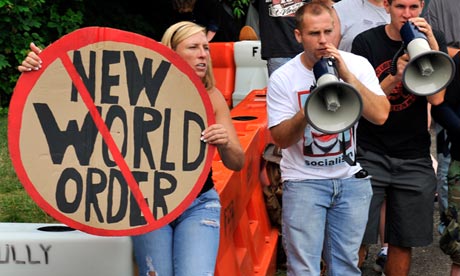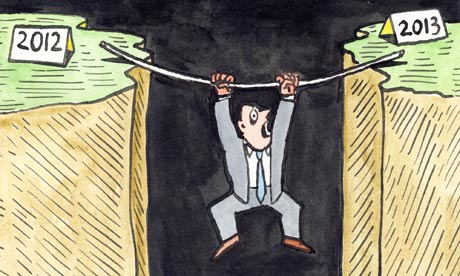The Bilderberg group's meeting will receive greater scrutiny than usual as journalists and bloggers converge on Watford

Protesters at Bilderberg 2012. This year's meeting of the global elite is in Watford and is expected to be unusually open. Photograph: Mark Gail/The Washington Post
When you're picking a spot to hold the world's most powerful policy summit, there's really only one place that will do: Watford. I guess the Seychelles must have been booked up.
On Thursday afternoon, a heady mix of politicians, bank bosses, billionaires, chief executives and European royalty will swoop up the elegant drive of the Grove hotel, north of Watford, to begin the annual Bilderberg conference.
It's a remarkable spectacle – one of nature's wonders – and the most exciting thing to happen to Watford since that roundabout on the A412 got traffic lights. The area round the hotel is in lockdown: locals are having to show their passports to get to their homes. It's exciting too for the delegates. The CEO of Royal Dutch Shell will hop from his limo, delighted to be spending three solid days in policy talks with the head of HSBC, the president of Dow Chemical, his favourite European finance ministers and US intelligence chiefs. The conference is the highlight of every plutocrat's year and has been since 1954. The only time Bilderberg skipped a year was 1976, after the group's founding chairman,Prince Bernhard of the Netherlands, was caught taking bribes from Lockheed Martin.
It may seem odd, as our own lobbying scandal unfolds, amid calls for a statutory register of lobbyists, that a bunch of our senior politicians will be holed up for three days in luxurious privacy with the chairmen and CEOs of hedge funds, tech corporations and vast multinational holding companies, with zero press oversight. "It runs contrary to [George] Osborne's public commitment in 2010 to 'the most radical transparency agenda the country has ever seen'," says Michael Meacher MP. Meacher describes the conference as "an anti-democratic cabal of the leaders of western market capitalism meeting in private to maintain their own power and influence outside the reach of public scrutiny".
But, to be fair, is "public scrutiny" really necessary when our politicians are tucked safely away with so many responsible members of JP Morgan's international advisory board? There's always the group chief executive of BP on hand to make sure they do not get unduly lobbied. And if he is not in the room, keeping an eye out, then at least one of the chairmen of Novartis, Zurich Insurance, Fiat or Goldman Sachs International will be around.
This year, there will be a great deal more "public scrutiny" of Bilderberg. Pressure from journalists and activists has won concessions from the venue: for the first time in 59 years there will be an unofficial press office, staffed by volunteers, on the grounds. Several thousand activists and bloggers are expected, along with photographers and journalists from around the world.
Back in 2009 there were barely a dozen witnesses – harassed and arrested by heavy-handed Greek police. This year there is a press zone, police liaison, portable toilets, a snack van, a speakers' corner – all the ingredients for a different Bilderberg. A "festival feel" has been promised. If you are concerned about transparency or lobbying, Watford is the place to be next weekend. Whether the delegates reach out to the press and public remains to be seen. Don't forget, they've got their hands full carrying out the good works of Bilderberg. The conference is, after all, run as a charity.
If you've been wondering who picks up the tab for this gigantic conference and security operation, the answer arrived last week, on a pdf file sent round by Anonymous. It showed that the Bilderberg conference is paid for, in the UK, by an officially registered charity: the Bilderberg Association (charity number 272706).
According to its Charity Commission accounts, the association meets the "considerable costs" of the conference when it is held in the UK, which include hospitality costs and the travel costs of some delegates. Presumably the charity is also covering the massive G4S security contract. Fortunately, the charity receives regular five-figure sums from two kindly supporters of its benevolent aims: Goldman Sachs and BP. The most recent documentary proof of this is from 2008 (pdf), since when the charity has omitted its donors' names (pdf) from its accounts.
The charity's goal is "public education". And how does it go about educating the public? "In furtherance of these objectives the International Steering Committee organises conferences and meetings in the UK and elsewhere and disseminates the results thereof by preparing and publishing reports of such conferences and meetings and by other means." Cleverly, it disseminates the results by resolutely keeping them away from the public and press.
The charity is overseen by its three trustees (pdf): Bilderberg steering committee member and serving minister Kenneth Clarke MP; Lord Kerr of Kinlochard; and Marcus Agius, the former chairman of Barclays who resigned over the Libor scandal.
Labour MP Tom Watson remarks: "If the allegations that a cabinet minister sits on the board of a charity that discreetly funds a secretive conference of elites are true then I hope the prime minister was informed. It was David Cameron who heralded the new age of transparency. I hope he asks Kenneth Clarke to adhere to these principles in future." At the very least, George Osborne and Clarke may consider adhering to the ministerial code when it comes to Bilderberg and declare it in their list of "meetings with proprietors, editors and senior media executives" as they've failed to do in the past. Of course, with the lobbying scandal in full spate it's possible our ministers will steer clear of such a major corporate lobbying event. We'll find out on Thursday.




 221 Comments
221 Comments